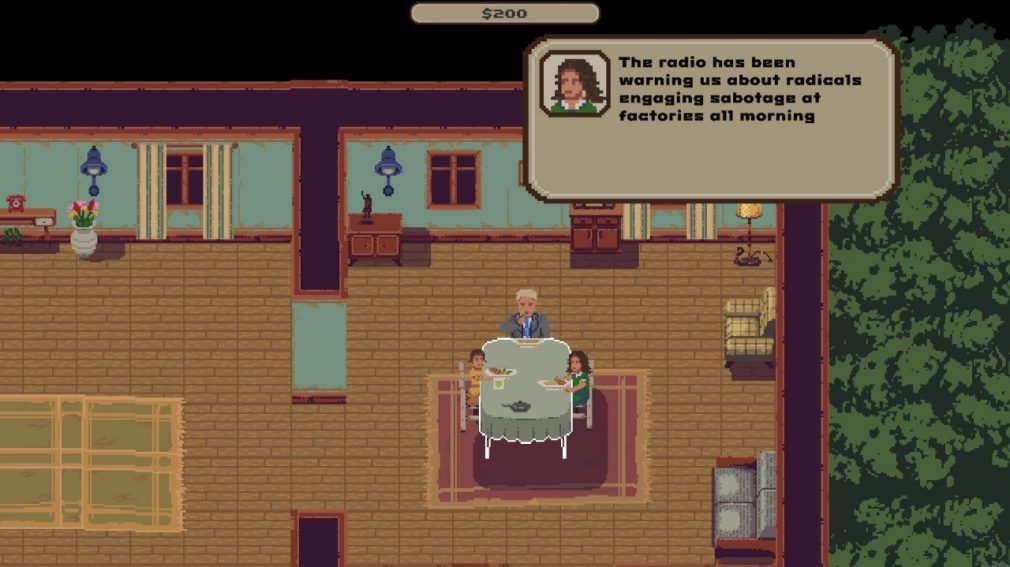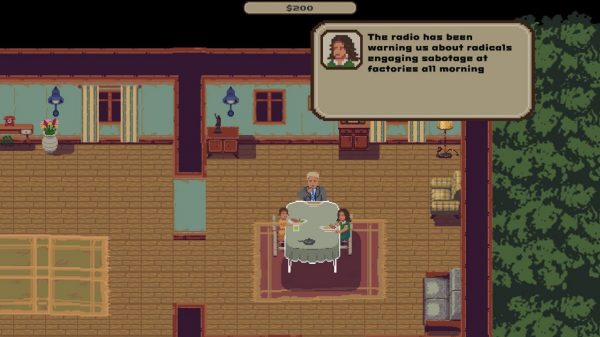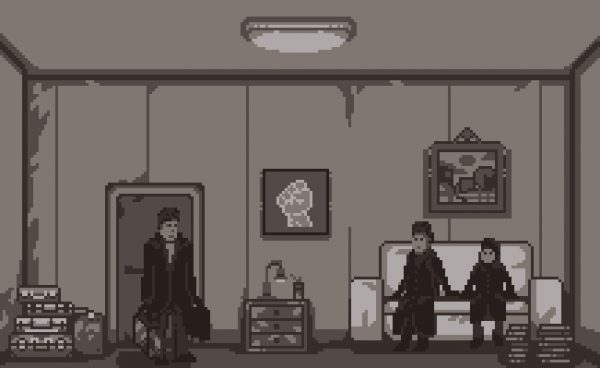Also on: Xbox One, Xbox Series X, PC, PS4
Publisher: Sometimes You
Developer: Civil Savages
Medium: Digital
Players: 1
Online: No
ESRB: T
On the Steam page for Norman?s Great Illusion, the game?s developers wrote the following:
?If You: – do not distinguish between class struggle and spiritual struggle; – believe that imperialism is a confrontation of ancient empires; and – think that nothing could be better than capitalism; please DO NOT BUY our game.”
As you can probably tell from that, this is a game that has Something To Say — and yes, the capitalized letters are important, because this game clearly takes itself very seriously. Between the ?revolutionary” quotes that start every day in the game and the one ?good” ending being the one where you and your family go on the run with a Marxist study group and eventually help start a new just society, there?s a not-at-all-subtle ideological streak running through this game.
Here?s the thing, though: it?s all a pile of gibbering, useless garbage.
(The game, that is. Not necessarily the ideology underlying it — though if I?m being honest, that?s only slightly more coherent than this drek.)
The biggest issue with Norman?s Great Illusion is that even though it?s presented as delivering all these great, grand truths, it?s an incoherent mess. It?s very clearly influenced by games like Papers, Please and Beholder 2, which try to show you the inherent absurdity of living under an authoritarian/totalitarian dictatorship. In those games, you have to make your living in a world full of paranoia and rules that change day to day. Even as the contradictions started to pile up and you had to navigate systems in which failure was the inevitable outcome, those games found a way to make clerical banality seem thrilling.
Let?s just say that Norman?s Great Illusion doesn?t do that. Between what I mentioned above and the fact that the interstitial quotes between your home life and your work life are things like ?First they came for the socialists, and I did not speak out, because I was not a socialist” and ?There is no war but class war” it seems pretty clear that the game is trying to critique capitalism. Except…it doesn?t. Like, at all. In this game, you get up in the morning, have a mundane conversation with your wife where she repeats the propaganda that she?s heard on the radio, drive to work, do math, and go home. Then you repeat those actions until you trigger one of the game?s seven endings.
As critiques of capitalism go, it?s pretty baffling. Maybe someone told the developers that in Marxist utopias, you don?t have to drive to work every day or do repetitive jobs (especially ones that involve math)? Or that there?s no propaganda of any kind? If Norman’s Great Illusion were a critique of an authoritarian dystopia, it would make sense, but because it’s so committed to a very specific ideology, it’s too blinded to see that it’s not coming anywhere close to making the point it seems to think it’s making.
In any case, even setting aside the ideology, it doesn?t make for particularly interesting or compelling gameplay. The dialogue is wooden and stilted, and the driving and math minigames are simplistic and dull. And seeing as that?s literally everything there is to do in Norman?s Great Illusion, that means there?s no reason to pick it up.
And if you factor in the incoherent ideology? Well, then it goes from being just plain dull to being dull and doltish. Norman?s Great Illusion may think of itself as a treatise designed to make you think and awaken a class consciousness, but the reality is that it?s closer to a cheaply printed pamphlet that?s not even worth the sheet of paper it?s printed on — or, in this case, it?s not even worth the bandwidth you?d use to download it or the bytes it would take up in your harddrive.
Sometimes You provided us with a Norman?s Great Illusion PS Vita code for review purposes.




